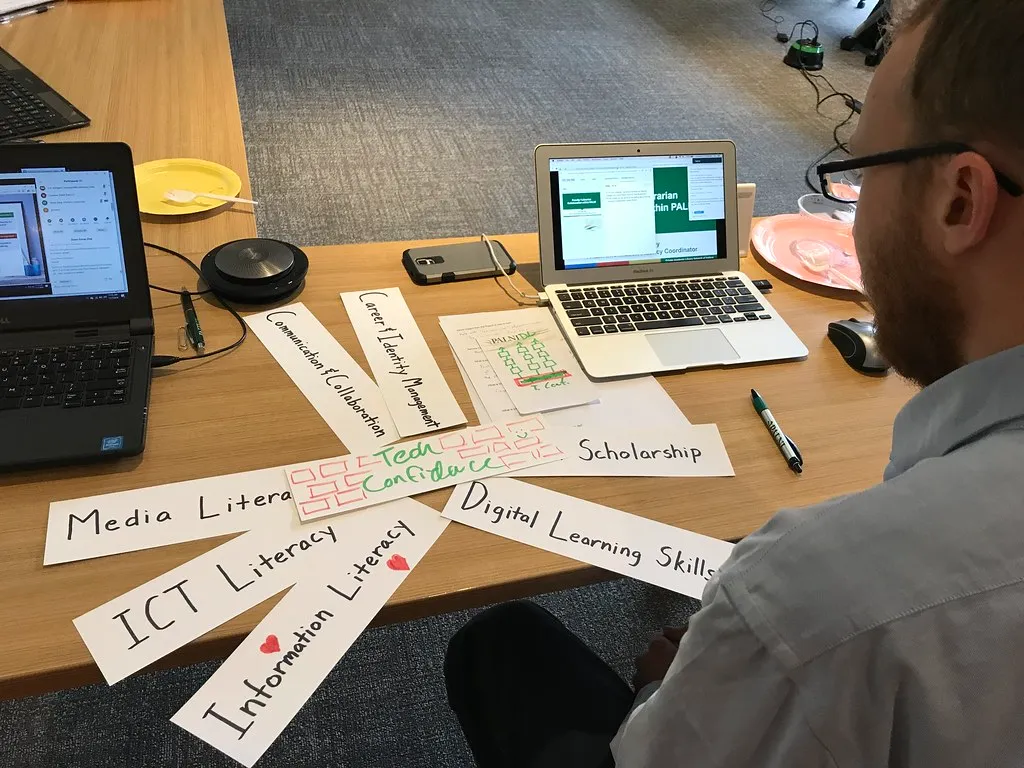Introduction
Impact of Digital Technology in the Modern Workplace
Navigating the digital world
The last decade of the twenty-first century has been a decade of huge shifts in how we work, communicate, and generally go about our daily activities. From computing in the cloud and artificial intelligence to data analytics and tools for digital communication, the workplace is slowly but progressively becoming very dependent on technology. It has brought along with it developments such as efficient workflows, enhanced collaboration, and the capability of working remotely. However, this also calls for professionals to keep on their feet to be able to adapt to new tools and technologies if they are to remain relevant in their careers.
Importance of Keeping Up with the Times in Digital Skills
Since technology is advancing at a very high speed, it has become imperative to keep updating oneself related to digital skills. Employers are not only searching for candidates with strong basic digital literacy but also look forward to more advanced skills that could drive innovation and efficiency. Staying abreast of the digital environment and continually acquiring new skills will help professionals become competitive in the job market. It will give them the ability to overcome any kind of challenge presented to them as part of their job.
This blog serves to explain in greater detail the key digital skills relevant in contemporary careers. Regardless of whether you are entering or attempting to progress through a career, the possession of such skills would definitely give you a better edge. These competencies will help you gain confidence and achieve better prospects for a job; they will also enable better performance in a job.
How Mastering These Skills Can Improve Job Prospects and Performance
Acquiring essential digital skills not only makes one a more attractive candidate to any possible future employer but also enhances productivity and effectiveness in their present role. Such skills will make an individual work efficiently, collaborate better with colleagues, and be adaptable to new challenges. Ultimately, developing digital literacy can bring greater career growth, many more opportunities, and successful long-term careers.
Navigating the digital world includes:
1. Digital Literacy
Elementary Digital Skills
Relevance in Contemporary Workplaces
In today’s digital era, some form of fundamental digital literacy is, more or less required in every workplace. It refers to the ability to use general applications of software, learn how to use the Internet safely, and methods to troubleshoot basic technical problems. These skills are the foundation for more sophisticated digital skills.
Core Competency in Tools and Software
Microsoft Office Suite: Word, Excel, and PowerPoint are business-critical for document writing, data management, and information representation.
Google Workspace: Google Docs, Sheets, and Slides are widely used in current times due to their interactive collaboration features amongst teams.
Use of email clients and calendar applications for communication and meeting management.

Advanced Digital Skills
Data Analysis and Visualization Tools
Excel and Tableau: Deep understanding of Excel, particularly in using formulas, pivot tables, and the data visualization module. Tableau is yet another power tool in making interactive and shareable data visualizations.
SQL: Knowledge of SQL for querying databases and extracting meaningful insights from large datasets.
Understanding and use of cloud computing
AWS and Google Cloud: Knowledge of cloud computing platforms like Amazon Web Services and Google Cloud Platform is fast gaining paramount status in positions associated with managing and deploying applications or services in the cloud.
Cloud Storage and Collaboration: Apply cloud storage solutions such as Google Drive and Dropbox for safekeeping and file sharing.
2. Cybersecurity Awareness
Understanding Cybersecurity Basics
Importance of Cybersecurity in the Digital Age
As more and more companies take their business online, the role of cybersecurity can hardly be overemphasized. Cybersecurity will ensure that sensitive information is safe from cyber threats and thus help in upholding trusting relations in this connected world.
Basic Concepts and Practices
Strong Passwords: Creation and management of strong and unique passwords in various account uses.
Phishing Awareness: Identifying and avoiding phishing scams that may pose an attempt to either extract personal information or login credentials.
Regular Software Updates: Keeping software and systems against potential vulnerabilities.

Advanced Cybersecurity Skills
Cybersecurity Tools and Protocols Knowledge
Firewalls and Antivirus Software: Understand what firewalls and antivirus do to protect systems from attacks.
Encryption: Awareness of how to use encryption methods to protect sensitive data in motion and at rest.
Incident Response: Knowledge of processes for handling security incidents and containing additional damages.
Importance of Keeping Up-to-Date and Continuous Learning
One of the fastest-growing domains, a new threat comes up almost every day. In order to protect digital assets, one needs to continuously keep updating about the recent developments and upskill oneself at regular intervals.
3. Digital Communication Skills
Verbal and Non-Verbal Communication
Effective Speaking and Active Listening
Successful communication, be it any form of a job, requires verbal and non-verbal articulation. This includes clear speech, confident speech, body expressions, and eye contact.
Understanding Body Language and Digital Communication Cues
Body Language: Awareness and accurate interpretation of body language cues enhance video conference communication.
Digital Cues: Knowing the tone and timing of digital communication is vital in one’s online interactions.

Digital Communication Competency
Mastering Email and Online Communication Tools
Email Etiquette: How to Write Clear, Concise, Professional Emails
Online Tools: Knowing how to use Slack, Zoom, and Microsoft Teams properly to communicate fluently and appropriately
Establish a Professional Online Presence
LinkedIn—To properly set up and maintain a professional LinkedIn page for networking and engaging with others in the profession.
Personal Branding: It simply refers to the consistency of a professional image across all online platforms.
4. Social Media Literacy
How to Understand Social Media Platforms
Survey of Key Platforms
Facebook, Twitter, LinkedIn: Unique features and applications of each platform for professional networking purposes and personal branding.
Instagram, TikTok: How to leverage visual content and short-form for branding and engagements.
Role of Social Media in Professional Networking and Personal Branding
Social media sites are wonderful tools for developing professional relationships and your expertise, and even your personal brand.
Effective Strategies for Social Media
Content Development and Sharing
Developing Engaging Content: Research-based articles, thought leadership pieces, engagement in industry-relevant content.
Consistency: The regularity in updating and keeping up-to-date your profiles is very important.
Managing Digital Footprint and Online Reputation
Privacy Settings: privacy settings can be adjusted to allow control over the audience that can view your information and posts.
Reputation Management: Ensuring whatever comes up about you online aligns with professional goals.
5. Project Management Tools and Techniques
Overview of Project Management
Importance of Project Management in Contemporary Careers
The importance of project management lies in the fact that, if done effectively, projects will get completed on time and within the budget and to desired quality standards. It’s a skill valued in nearly any industry.
Basics of Project Management Principles and Practices
Agile and Scrum: Understand agile methodologies and how they allow for flexibility and improvement.
Waterfall: Knowing when and how to apply the traditional waterfall approach to project management.
Project Management Software Proficiency
Tools such as Asana, Trello, Microsoft Project
Asana and Trello: Using them for task management, team collaboration, and project tracking.
Microsoft Project: Advanced level of project planning and scheduling.
How to Use Project Management Software for Effective Team Collaboration
Tasking: Assign tasks and set deadlines to hold people accountable.
Progress Tracking: The project progress is checked, and necessary changes are implemented.
6. Data Analysis and Interpretation
Understanding the Basics of Data
Why Data is Important for Decision Making
With the contemporary business environment, data-driven decision making becomes paramount in every aspect. Proper understanding and interpretation of data are therefore very instrumental in making informed decisions for the success of the business.
Some Basic Statistical Concepts and Data Interpretation
Descriptive Statistics: Mean, median, mode, and standard deviation explained.
Charts and graphs: The proper way of presentation of data in a graphical form.
Advanced Data Skills
Tool Skill in Using for Business Analytics
Excel and SQL: Manipulation of advanced data analysis.
Tableau and Power BI: Development of interactive dashboards and reports.
Techniques for Data Visualization and Reporting
Storytelling with Data: The visualization of data in a clear, storytelling manner which is actionable.
Creation of Dashboards: Dashboards that deliver real-time insight and analytics.
7. Adaptability and Continuous Learning
Adapting to the Changing Digital Environment
Need for Adaptability and Flexibility
The ability to learn and adapt to new technologies and methodologies in this fast-changing digital environment is a highly desirable and key skill to any career. Flexibility in learning and picking up new competencies is an important criterion for differentiating careers.
Continuous Learning and Upskilling Strategies
Self-Directed Learning: Proactive initiative for learning new skills and technologies.
Cross-Training: Becoming conversant in many areas to enhance versatility.
Continuous Learning Resources
Online Courses and Certifications
Coursera and edX: Sources of courses from top universities and companies.
Certifications: Acquiring certifications pertaining to relevant skills to add to your qualification.
Networking and Mentorship Opportunities Professional Associations: Industry-specific groups and associations to join.
Mentorship: Finding mentors to help guide and support your development in your career.
Conclusion
We have gone through quite a number of key digital skills that are prerequisites in modern careers, which include:
Basic Digital Literacy: Competency in common software applications and how to maneuver within the internet.
Advanced Technology Skills: Data analysis, cloud computing, and cybersecurity
Digital Communication Skills: Effective verbal and non-verbal communication. Mastering online communication tools and building a professional online presence.
Social Media Literacy: Key social media platforms understood and utilized for professional networking and personal branding purposes.
Project Management Tools and Techniques: Core concepts of project management are coupled with proficiency in project management software.
Data Analysis and Interpretation: Mastery of basics of data processing and advanced data competencies to support effective decisions
Adaptability and Continuous Learning: Tolerance for change, upskilling to remain relevant in the digital world.
Why these skills need to be integrated into daily routines
Daily work routines integrated with such digital competencies are surely going to enhance your productivity, efficiency, and effectiveness manifold. By applying these competencies every day, you will be able not only to enhance your performance in your current job but also contribute to your further career promotion. From using data for making informed decisions and project management tools for smooth workflows to a good online presence, these skills are absolutely necessary in the digital age.
Reasons to Invest in the Development of Digital Skills
Benefits of Keeping Up with Digital Trends and Technologies
Many benefits accrue from investing in the development of digital skills, including:
Better Job Prospects: If you have up-to-date knowledge and skills in respect to digital, then you are much more likely to be considered for an employment opportunity.
Improved Job Performance: Digital tools and technologies, if harnessed properly, may result in efficiency and effectiveness in your job.
Career Growth: It may discover new opportunities and career growth, achieved through continuous learning and upskilling.
Adaptability: Staying updated about digital trends will ensure that you adapt quickly to new changes at the workplace or industry.


